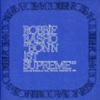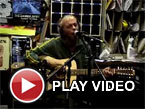Robbie Basho, "Bonn ist Supreme"
 Almost 23 years after his death, Robbie Basho's cosmic approach to steel-string guitar is the stuff of legend. On this 1980 live recording, Basho's exciting and perplexing playing is sometimes punctuated by his delightfully unfashionable and extraordinarily full-throttle singing.
Almost 23 years after his death, Robbie Basho's cosmic approach to steel-string guitar is the stuff of legend. On this 1980 live recording, Basho's exciting and perplexing playing is sometimes punctuated by his delightfully unfashionable and extraordinarily full-throttle singing. While often mentioned in the same breath as John Fahey and Leo Kottke, it’s possible to draw a line connecting Robbie Basho back to Blind Willie McTell and Ravi Shankar, and forward to Sir Richard Bishop, Steffen-Basho-Junghans, Matt Valentine, Jack Rose, and James Blackshaw. In that sense Basho is an important link back to the country blues past and to myriad tunings and styles from across the globe.
Robbie Robinson went to a military school, then did pre-med, lacrosse, weightlifting, sang in choirs, and played trumpet. In his embrace of individualism and creative freedom, he bought an old Mexican 12 string, wrote poetry, painted, and took the name Basho in honor of haiku poet Matsuo Basho. Blues, folk, and classical European modes were studied but his raga style emerged after hearing Shankar’s early 1960s sitar records. Basho used open C and more exotic tunings and he developed an esoteric doctrine for 12- and 6-string guitar, concerned with color and mood. He spoke of “Zen-Buddhist-Cowboy songs” a long time before Gram Parsons mentioned his vision of Cosmic American music.
Basho made several albums for Fahey’s Takoma label, and was similarly interested in using the guitar as a formal concert instrument. His humor and graciousness are often lost amid accusations of an overly-reverential approach and the fire in his playing unfairly ignored due to his later association with the Wyndham Hill label. Before his death Basho continued to expand his compositional and harmonic ideas into classical scores. He wrote “a Sufi symphony” and another for piano and orchestra about the Spanish and Christian cultures coming to America.
As the liner notes reveal, Bonn ist Supreme has been polished up from a second-generation cassette tape and the original source master tapes are missing, possibly destroyed. Even so there is enough clarity and a wild resounding joyfulness to be heard here on such tracks as “Rocky Mountain Raga,” “Easter,” and “The Grail and the Lotus.” I find “German Chocolate Cake” as strange and unsatisfying as the dessert itself (note that this track has been recorded elsewhere as “Ackerman Special”). Amongst the other offerings are “Fandango” and “Silky Jane,” two pieces that Basho may have never recorded in the studio. Also, “Cathedrals et Fleur de Lis” is a fine rendition of the track which originally appeared in 1969 on Basho’s Venus in Cancer album.
samples:



